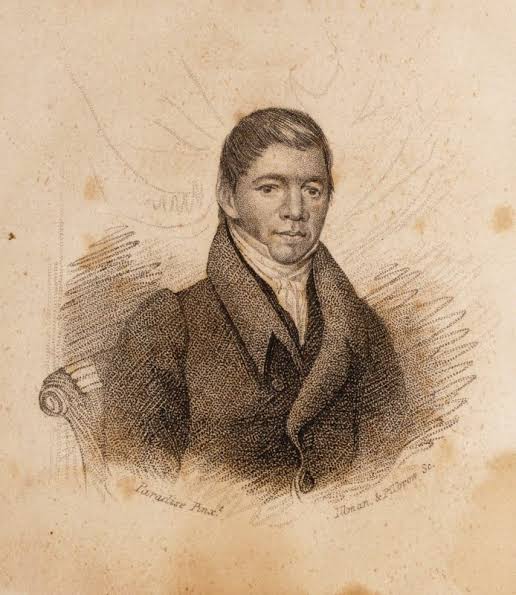ACTIVIST
William Apes

William Apes, the son of Candace and William Apes, lived many lives within his short 41 years. Of mixed Pequot, African and European ancestry, Apes was a respected public speaker and writer who was deeply aware of the history of the nation, the political conversations of the day, and the systemic oppression of Indigenous peoples. He is considered, by some, to be one of the most successful Indigenous Rights activists of the antebellum era. (7)
Removed from the home of his abusive grandparents at the age of five, he was put into indentured servitude with a white family that encouraged his early education and awakened in him a deep interest in religion. Despite the development of familial bonds after 6 years with the Fairmons, his indenture was sold twice before he eventually ran away to join the military at age 15. (2) After fighting in the War of 1812 and working various jobs in Canada, Apes found his calling as a Protestant Methodist minister, traveling and preaching around New England before settling with his wife among the Mashpee Wampanoag. (1)
In Mashpee, Apes found a new sense of purpose. Indignant because of the treatment the Mashpee Wampanoag received from their appointed white overseers, Apes helped lead a sustained and successful campaign to assert Mashpee’s independence and expose systematic violation of Indigenous rights. Perhaps because of his own struggles with alcohol beginning in his youth, in 1833, Apes also founded and presided over the first formal Indigenous temperance society, an organization promoting abstinence from alcohol, which forty-two Mashpee immediately joined.
Apes’s sermons and letters were widely published, including in anti-slavery publications, and his autobiography A Son of the Forest: The Experience of William Apess, A Native of the Forest, Comprising a Notice of the Pequot Tribe of Indians, Written by Himself (1829) is one of the first published Native American autobiographies. His 1836 sermon Eulogy on King Philip, delivered in Boston just two years before the Cherokee were forcibly removed from their homelands, pointedly examines the brutal, hypocritical and unchristian-like treatment of early European settlers towards the Wampanoag, while extolling the virtues of King Philip (Metacomet), the great Wampanoag leader assassinated by colonists. (4)(5)
1. A Son of the Forest: The Experience of William Apes, A Native of the Forest, Comprising a Notice of the Pequod Tribe of Indians, Written by Himself (1829) via the Internet Archive.
2. The Experiences of Five Christian Indians of the Pequod Tribe; or An Indian's Looking-Glass for the White Man (1833), via the Internet Archive.
3. The Indian Nullification of the Unconstitutional Laws of Massachusetts, Relative to the Marshpee Tribe: or, The Pretended Riot Explained (1835),via the Internet Archive.
4. "Eulogy on King Philip, as Pronounced at the Odeon, in Federal Street, Boston, by the Rev. William Apes, an Indian" (1836), via the Internet Archive.
5. Teutsch, Matthew. “King Philip, William Apess, and the Emergence of a Distinct American Literature.” Interminable Rambling. February 2, 2016 (https://interminablerambling.com/2016/02/02/king-philip-william-apess-and-the-emergence-of-a-distinct-american-literature/)
6. “Indians in Mashpee Demand Self-Government.” Mass Moments (https://www.massmoments.org/moment-details/indians-in-mashpee-demand-self-government.html)
7. Bizzell, Patricia. "(Native) American Jeremiad: The 'Mixedblood' Rhetoric of William Apess", in Stromberg, Ernest. ed. American Indian Rhetorics of Survivance: Word Medicine, Word Magic, Pittsburgh: University of Pittsburgh Press, 2006


